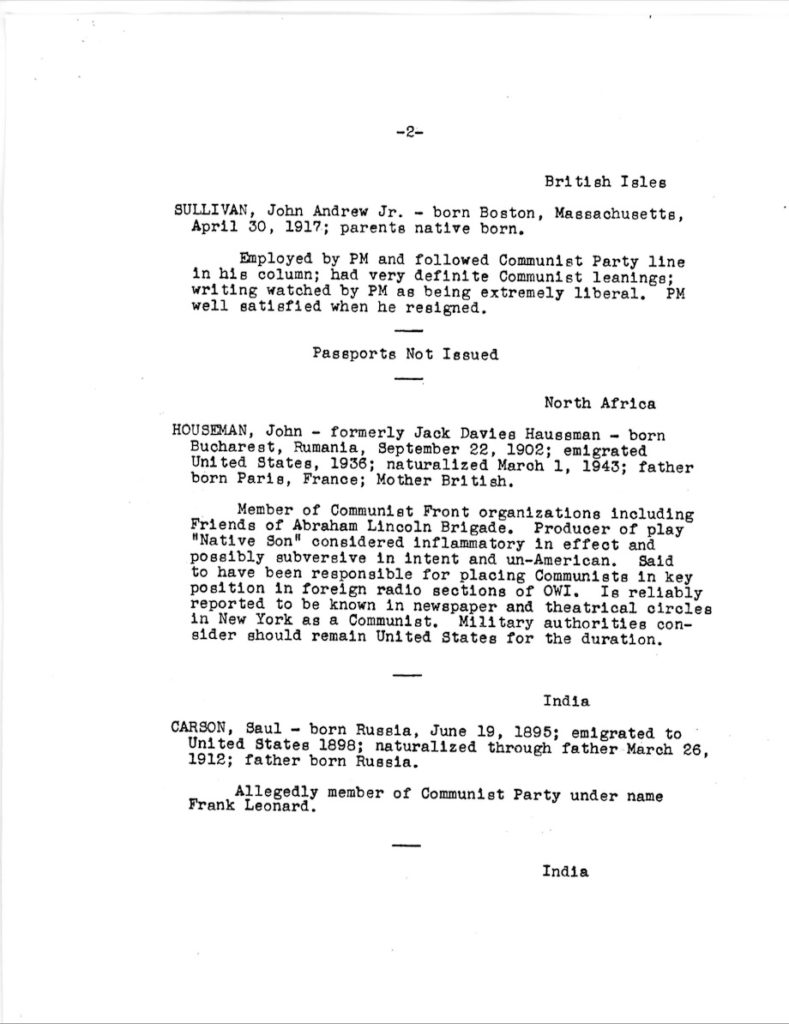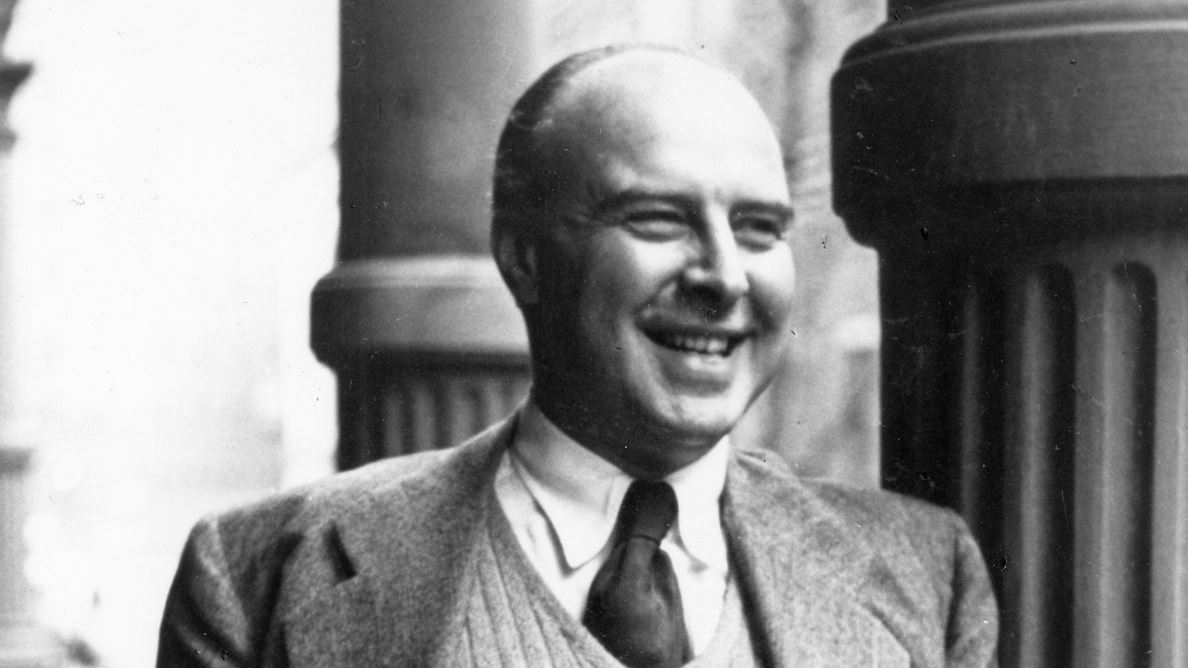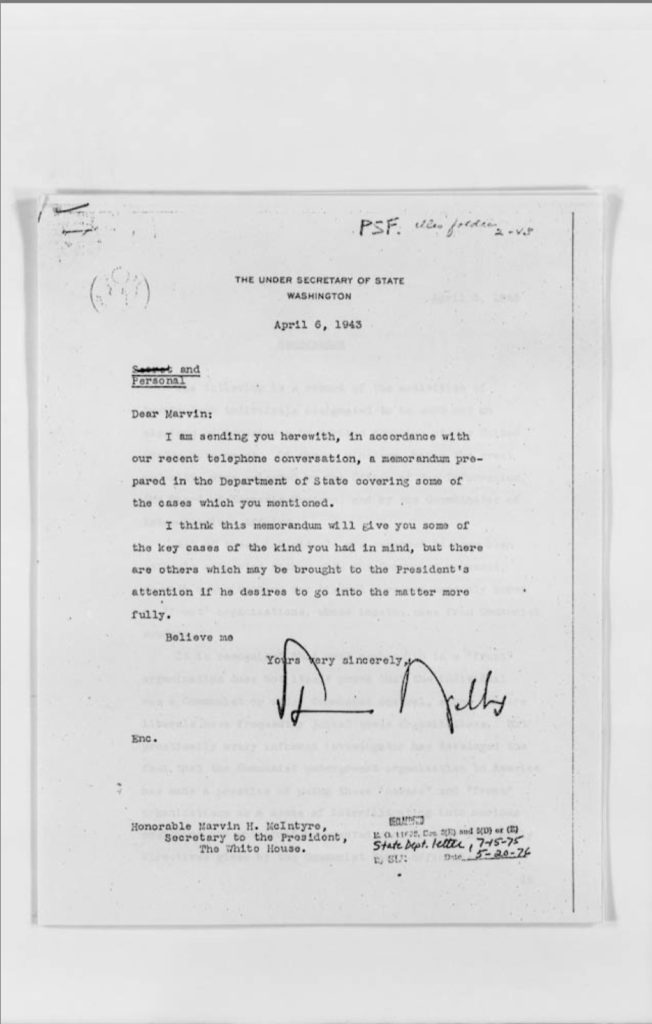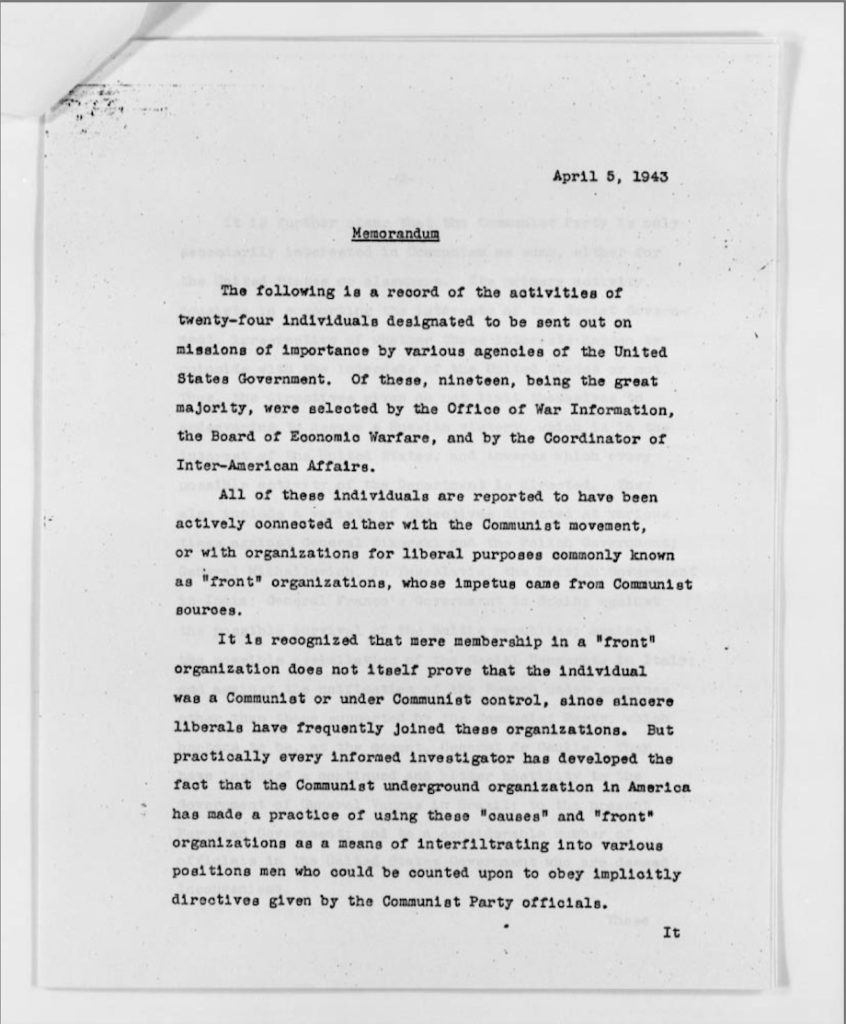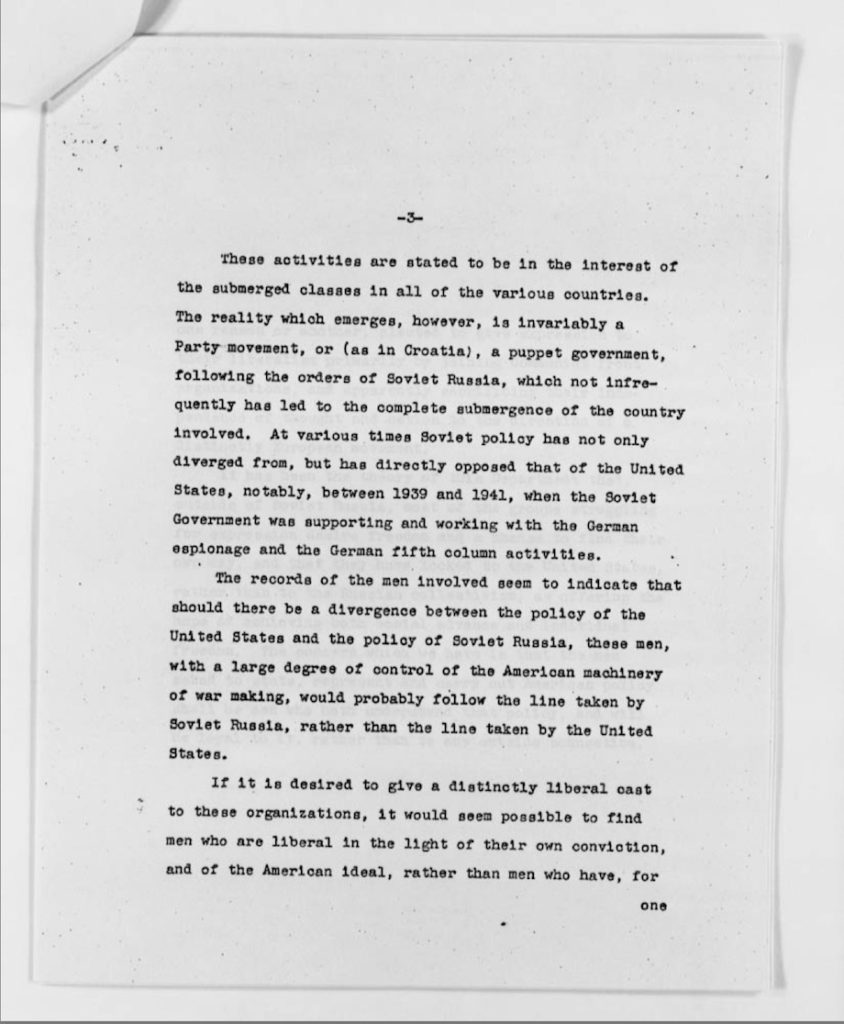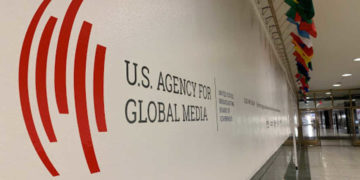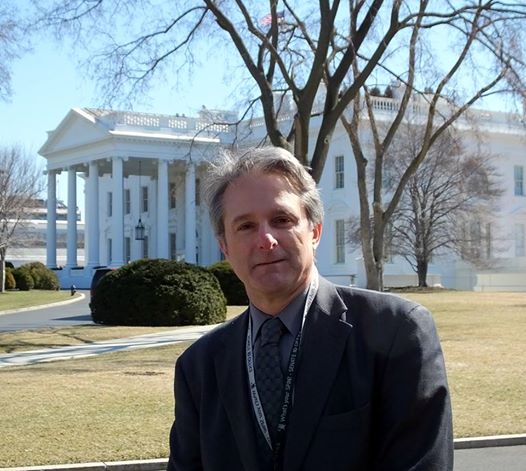USAGM Watch Halloween Commentary
By Ted Lipien
Happy Halloween! But don’t be fooled by fake radio news.
Orson Welles’ partner in producing the infamous adaptation of H. G. Wells’ The War of the Worlds as a pre-Halloween fake radio news broadcast, which aired on October 30, 1938 over the CBS radio network and caused considerable panic, was future Oscar-winning Hollywood actor John Houseman. He was also later the first Voice of America (VOA) director although he did not stay in his U.S. government position for too long before being quietly forced to resign by Roosevelt administration State Department and U.S. military intelligence officials for being too pro-Soviet.[ref]Under Secretary of State Sumner Welles April 6, 1943 memorandum to Marvin H. McIntyre, Secretary to the President with enclosures, Franklin D. Roosevelt Library and Museum Website, Box 77, State – Welles, Sumner, 1943-1944, http://www.fdrlibrary.marist.edu/_resources/images/psf/psfb000259.pdf. The Welles memorandum is also accessible at: State – Welles, Sumner, 1943-1944, From Collection: FDR-FDRPSF Departmental Correspondence, Series: Departmental Correspondence, 1933 – 1945 Collection: President’s Secretary’s File (Franklin D. Roosevelt Administration), 1933 – 1945, National Archives Identifier: 16619284, https://catalog.archives.gov/id/16619284. Also see: Ted Lipien, “First VOA Director was a pro-Soviet Communist sympathizer, State Dept. warned FDR White House,” Cold War Radio Museum, May 4, 2018, http://www.coldwarradiomuseum.com/state-department-warned-fdr-white-house-first-voice-of-america-director-was-hiring-communists/.[/ref] It was not a trivial inside-the-government suspicion against Houseman since President Roosevelt and his administration were clearly big supporters of Stalin and the Soviet Union at the time when communist Russia was America’s war ally against Nazi Germany. It happened after some members of Congress and a few critics among American journalists started to complain that Voice of America was advancing Soviet rather than American interests. Future President Dwight E. Eisenhower who in 1943 was Supreme Commander of Allied Expeditionary Force secretly held the same view of the wartime Voice of America and after leaving the White House wrote about it in his 1965 memoir.
During World War II the Office of War Information had, on two occasions in foreign broadcasts, opposed actions of President Roosevelt; it ridiculed the temporary arrangement with Admiral Darlan in North Africa and that with Marshal Badoglio in Italy. President Roosevelt took prompt action to stop such insubordination.[ref]Dwight D. Eisenhower, The White House Years: Waging Peace 1956-1961 (Garden City: Doubleday & Company, 1965) 279.[/ref]
What is now unknown to almost all VOA journalists and most Americans is that John Houseman was correctly suspected by the State Department and the Army Intelligence in 1943 of being a Soviet sympathizer who hired communists to fill Voice of America positions. The State Department and U.S. military authorities secretly declared him as untrustworthy to be issued a U.S. passport for official government travel abroad in an attempt to force his resignation from his VOA job.
Most VOA journalists also do not know that John Houseman was initially hired by William J. Donovan, the head of what was then the U.S. intelligence agency which later split from its overt propaganda arm. Propaganda and psychological warfare operations remained under the direction of FDR’s speech writer and Houseman’s patron, Robert E. Sherwood, who was also strongly pro-Soviet and hired Houseman, partly because of his reputation as a pioneer of radio propaganda broadcasting and his fame as a co-producer of the fake news radio play Men from Mars, an adaptation of H. G. Wells’ The War of the Worlds.
Also shocking to many Voice of America journalists who may have read official VOA descriptions of Houseman as a defender and symbol of accurate and objective journalism may be his own statements referring to VOA in his books as a propaganda and psychological operations outlet.
In 1943, Houseman recruited Howard Fast to be Voice of America’s first chief news writer and editor. Fast became later a member of the Communist Party, an editor of its newspaper, The Daily Worker, and the 1953 recipient of the Stalin Peace Prize. In mid-1943, Houseman was secretly forced to resign from his VOA director’s position, but his pro-Soviet bosses kept giving him part-time work and unsuccessfully tried to hire him again in 1945. Howard Fast left VOA in early 1944 with a glowing recommendation from VOA’s second director Louis G. Cowan even though Roosevelt Administration officials in the State Department also refused to provide Fast with a U.S. passport for government travel abroad.[ref]Howard Fast, Being Red (Boston: Houghton Mifflin Company, 1990), 25.[/ref]
Many pro-Soviet VOA broadcasters hired by Houseman continued working at the Voice of America until the late 1940s and in a few cases into the early 1950s. A few of the early VOA broadcasters ended up as anti-U.S. propagandists employed by communist regimes. Houseman was so successful at disinformation that he managed to keep the news of his forced ousting from VOA a secret for many decades and claimed that he had resigned on his own. Those VOA officials and journalists who may have known about his pro-Soviet and pro-communist sympathies and about his forced resignation from VOA chose to hide the truth and created a myth of the first VOA Director as a defender of truthful journalism, but even Houseman admitted that he considered himself to be first of all a propagandist and he was definitely the father of fake radio news. At VOA he helped to spread Soviet propaganda and together with Howard Fast censored news about Stalin’s atrocities.
At the beginning of the second year of the Reagan administration, John Houseman was invited in February 1982 to speak at the VOA’s 40th anniversary observances in Washington, DC.[ref]Ted Lipien, “First VOA Director was a pro-Soviet Communist sympathizer, State Dept. warned FDR White House,” Cold War Radio Museum, May 5, 2018, https://www.coldwarradiomuseum.com/state-department-warned-fdr-white-house-first-voice-of-america-director-was-hiring-communists/.[/ref] The man who had been one of those in charge of wartime VOA broadcasts which perpetuated the most outlandish Soviet propaganda lies, including the main one about the Katyn Forest Massacre, told the audience of VOA journalists in the packed auditorium that “honest reporting had been the key to the Voice’s credibility” during World War II.[ref]Alan L. Heil, Jr., Voice of America: A History (New York: Columbia University Press: 2003), 208. Also see: Cold War Radio Museum, “OWI head Elmer Davis spread Soviet Katyn propaganda lie in World War II Voice of America broadcasts,” May 11, 2018, https://www.coldwarradiomuseum.com/owi-head-elmer-davis-promotes-soviet-katyn-propaganda-lie-in-the-us-and-in-voice-of-america-radio-broadcasts/.[/ref]
The man from Hollywood, who at one time had helped Stalin achieve his goals in Eastern Europe, gave advice on good journalism to the applause of VOA managers and reporters, very few of whom knew anything about his pro-Soviet propaganda in VOA’s first years. Some of those who did know about Houseman’s ideological legacy were among those opposed to changes being implemented at VOA by the Reagan administration and were not about to tell anyone the real story of his wartime years.
“We would have to report our reverses without weaseling,” Houseman stressed, speaking about VOA’s early promise to broadcast both good news and bad news.[ref] See: Alan L. Heil, Jr., Voice of America: A History (New York: Columbia University Press: 2003), 35.[/ref]
Listening in the audience were VOA Polish Service and other East European broadcasters, some of whom had to leave their country as refugees when the communist regime took power at the end of World War II. The 1945 Yalta Agreement was a historic and personal reversal for many of them, as well as a few years later for VOA broadcasters from some of the communist-ruled countries in Asia, Africa and Cuba. The communist takeover most likely could not have been avoided in the case of Eastern Europe due to Soviet military occupation, but it was made easier for Stalin and the local communists by the appeasement policy of the Roosevelt administration supported by even more pro-Soviet Voice of America radio broadcasts.
Houseman’s appearance at VOA’s 40th anniversary observances were the final propaganda triumph of the man who appeared not to feel any qualms. Through no effort of his own, but thanks to the help of a few of his admirers at VOA, Houseman became a symbol and a rallying point for the purity of Voice of America journalism. The truth is that at the outset of the Reagan administration, as well as now, no responsible expert or official contemplated using strident propaganda over good objective journalism at the Voice of America, but partisans have always attempted to present such stark choices to elicit sympathy for themselves and support for their cause.
In 1982, the Voice of America gave John Houseman Special Founder’s Award with the following wording most likely suggested by his admirers:
As one of the founders, you gave the young Voice of America the unique stamp of your creative energies. On VOA’s 40th Anniversary we salute your efforts.
The unique stamp had the words “pro-Soviet” written all over it, but except for Houseman and perhaps one or two individuals in the audience, no one else had any idea how VOA under his command had done its work for Stalin during World War II. Most of VOA’s East European broadcasters and Ronald Reagan had a much better insight into what kind of journalism it would take to topple peacefully the Soviet Union than some of Houseman’s fans at VOA. Those few who knew about Houseman’s pro-Soviet and pro-communist views while he was serving as the first VOA director and who in the 1980s opposed Reagan and his appointees at the Voice of America seemed to have been less bothered by it than by Reagan’s “evil empire” speech which filled them with horror. It was yet another propaganda triumph for John Houseman, the celebrated actor of many different roles.
Official Voice of America History Video, Posted November 13, 2019
From U.S. Government Archives
